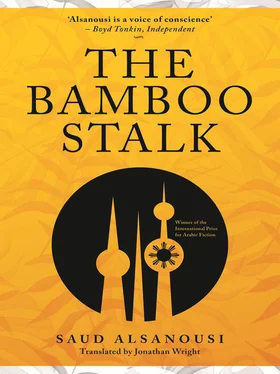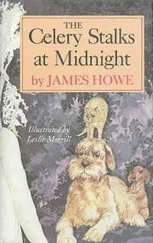I soon found it demeaning and embarrassing to take the money I received every month in return for being lazy. I felt increasingly useless now that a dream that had once seemed distant had come true. The truth about our dreams becomes clear to us the closer we get to them. We mortgage our lives for the sake of achieving them. The years pass. We grow older while the dreams stay as they were when we were young. We finally make them come true, and then we find that we have outgrown our dreams, which are the dreams of the young and not worth the trouble of waiting years for.
Giving without love has no value. Taking without gratitude has no savour. That’s what I have discovered. I looked at the floor in the middle of the sitting room. I imagined my mother there, sitting cross-legged by her suitcase a week after coming back from Bahrain. The family were around her on the sofas, everyone waiting for their present. ‘Pedro!’ Mother shouted, throwing him a cigarette lighter as blue as Merla’s eyes. Pedro was delighted with the present because it was a present. ‘Aida!’ — a pair of rubber shoes. ‘Merla’ — two pairs of underwear. Pedro’s wife — a bra. Pedro’s children — a bag of sweets and chocolates. ‘José’ — a pen and a school bag. Then Mother picked up a white hat, went to Adrian in his favourite corner and put it on his head.
I can still remember how happy everyone looked. Why wasn’t I as happy with the presents from my Kuwaiti family as Uncle Pedro was with a cigarette lighter that wasn’t worth more than 100 fils? It’s love that makes things valuable.
In my isolation I found I had a morbid longing for my family in the Philippines. I was nostalgic for home although I had started to become familiar with some of the things in my father’s country. The taste of the water still irritated me as much as when I first arrived. The water in the Philippines tastes better. I was no longer surprised when I saw men kissing when they greeted each other. I was no longer suspicious of strangers if they said hello to me as they walked past me. I even took the initiative and said ‘ As-salam aleekum ’ to them as I went past. It made me feel as if I knew everyone in the country, especially when Ibrahim explained to me that the word salam , which was also the name of his father, meant peace. What a beautiful greeting! It provided me with an outlet, however small, through which I could share something with Kuwaitis. But whenever I tightened my grip on the hem of Kuwait’s thobe, it slipped out of my grasp. I called Kuwait and it turned its back on me and I ran to the Philippines to complain.
It was hard for me to get used to my new country. I tried to focus narrowly on the people I loved there, but the aspects of Kuwait that they brought with them let me down. My father’s death left me adrift. Ghassan’s betrayal disappointed me. Grandmother and her incomplete love. Awatif’s weakness, rejection by Nouriya, Hind’s silence and my sister’s fatalistic attitude. How could I approach a country which had so many faces if, whenever I approached any one of them, it looked away?
My spacious flat seemed cramped. Talking to the dumb tortoise grew boring. I put on a coat to keep out the cold and set off headlong into the outside world. In the corridor outside my flat I waited for the lift. The lift door opened and a young Filipino who lived in the flat next door was there, carrying some plastic bags, some of them under his arms and some clutched to his chest. His face was barely visible behind them. ‘Hi, are you the new tenant?’ he asked. I nodded. ‘Before you go, please,’ he said with a laugh, ‘could you get my keys out of my coat pocket?’ I put my hand into the pocket and gave him the keys. ‘Could you open the door please?’ he said with a smile. I turned the key in the lock and pushed the door open. The man went in, leaving me at the door. He disappeared into one of the other rooms while I stood there, looking around the small sitting room. It had soft lighting, wallpaper on the wall, boxes of pastries, soft drinks and the smell of cooking. In one of the corners near the window there was a Christmas tree and a big sign above it saying Happy New Year 2007 . ‘What are your plans for this evening?’ the man asked from inside one of the rooms.
‘Nothing,’ I said.
He stuck his head out from one of the rooms. ‘You can come over and spend the evening with us,’ he said. ‘We’ll meet at ten.’
I accepted his invitation and my heart jumped for joy. I said goodbye, on the understanding that we’d meet again at ten.
I hung about in the street. It was about eight o’clock in the evening and bitterly cold. I looked around and then broke off three or four small green leaves. No one had noticed me. I closed my fist on them and crumbled them up between my fingers and thumb until I could feel the sticky sap on the palm of my hand. I brought my hand to my nose, closed my eyes and took a deep breath that filled my lungs with the smell. I opened my hand and the green leaves were still there. I had a close look. Mendoza’s piece of land, the four houses, Whitey the dog, the cocks and the frogs were all there on my trembling palm, fenced in by the bamboo plants. That alone got rid of half the homesickness I had felt in my seclusion. I needed to do something else to cure the rest of it. I looked around. There was a bus stop not far off, but there were some boys there. I waited till they had finished their senseless ritual: they were standing on the pavement by the roadway with stones ready in their hands, waiting to throw the stones at buses as they went past. Buses did go past: some stopped and others went past the bus stop without stopping. The boys kept trying until one of them had a good hit. The windscreen of the bus shattered and the boys took to their legs, disappearing down dark, narrow alleyways.
When the coast was clear, I hurried to the bus stop. There was a blue pole sticking out of the pavement. At the top there was a white metal sign with the logo of the bus company. I leaned against the pole as I waited for the bus. It didn’t matter what number bus it was. I didn’t need to know the destination. The only thing about the bus that mattered was the filthy black smoke that its engine would spew into the air around me. That would cure my homesickness. I closed my eyes and leaned back against the post. One bus after another went past. The thick black diesel exhaust rose in the air. I filled my lungs with it. I could smell the streets of Manila. A bus went past leaving a cloud of black smoke and punching holes in the ozone layer. One of the holes fell from the sky and landed on the ground. From the hole came the noise of car engines and horns. The sound of people speaking in Filipino and English. I stuck my head into the hole. Jeepneys and motor tricycles jostled for space in the street. Buses, trucks and motorbikes. Rain fell on the streets with all the might the clouds could muster. The smell of diesel vanished. The noises receded into the distance. The image of Manila faded, the hole shrank, and there I was — in a Jabriya street, leaning against a post, free of the homesickness I had felt a few moments earlier.
4
I spent New Year’s Eve in the flat next door. Just before midnight, everyone began to count down: ‘Ten, nine, eight. . three, two, one.’
The sky outside filled with fireworks and lights and noise. Car horns playing various tunes sang for joy. In the room, coloured paper streamers flew through the air. They sang in English and Filipino. People started the new year by wishing each other a Happy New Year and making resolutions to themselves that they hoped to keep. The flat where they had the party was a piece of my mother’s country: the faces, the language, the clapping and singing, the pictures on the television screen, the plates of adobo and white rice, the pastries, the sweets and glasses of home-made alcohol, the topics of conversation and the wishes, the friendly atmosphere. . and the smell.
Читать дальше












